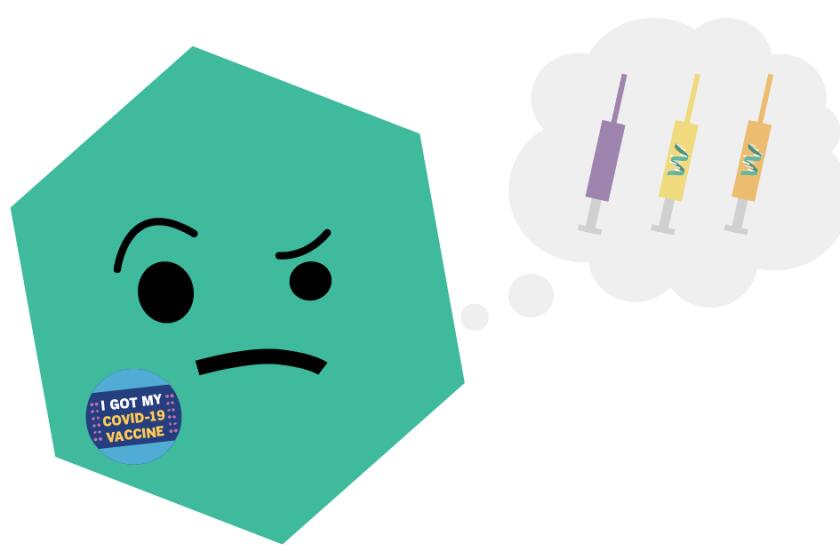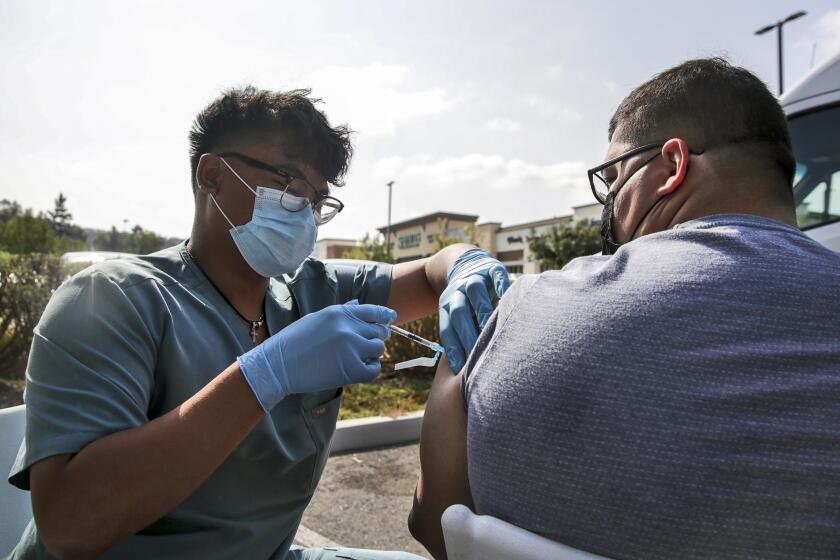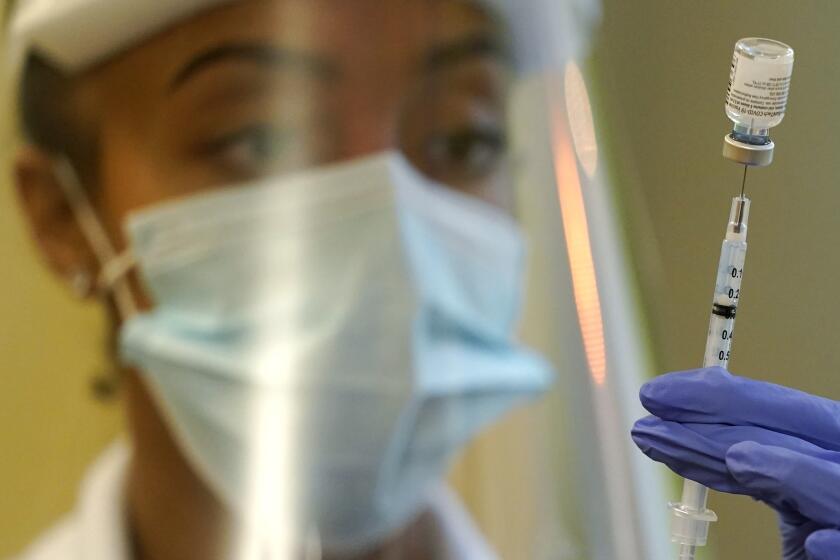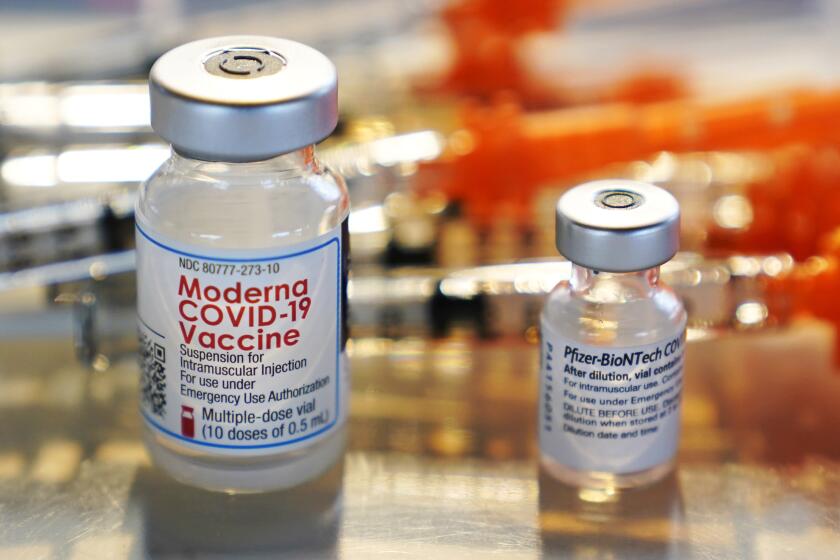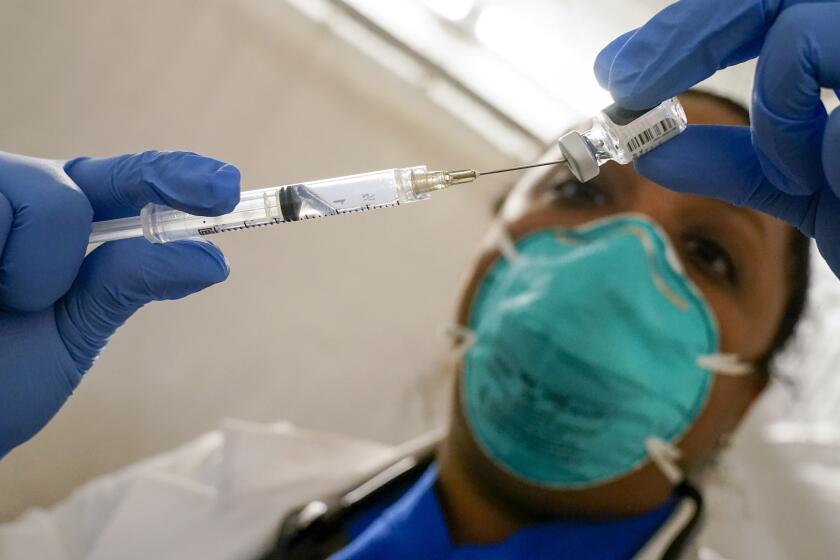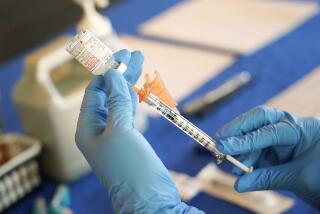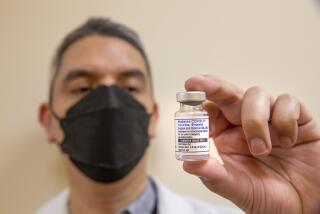Which COVID-19 vaccine booster shot should I get? Here’s how to choose
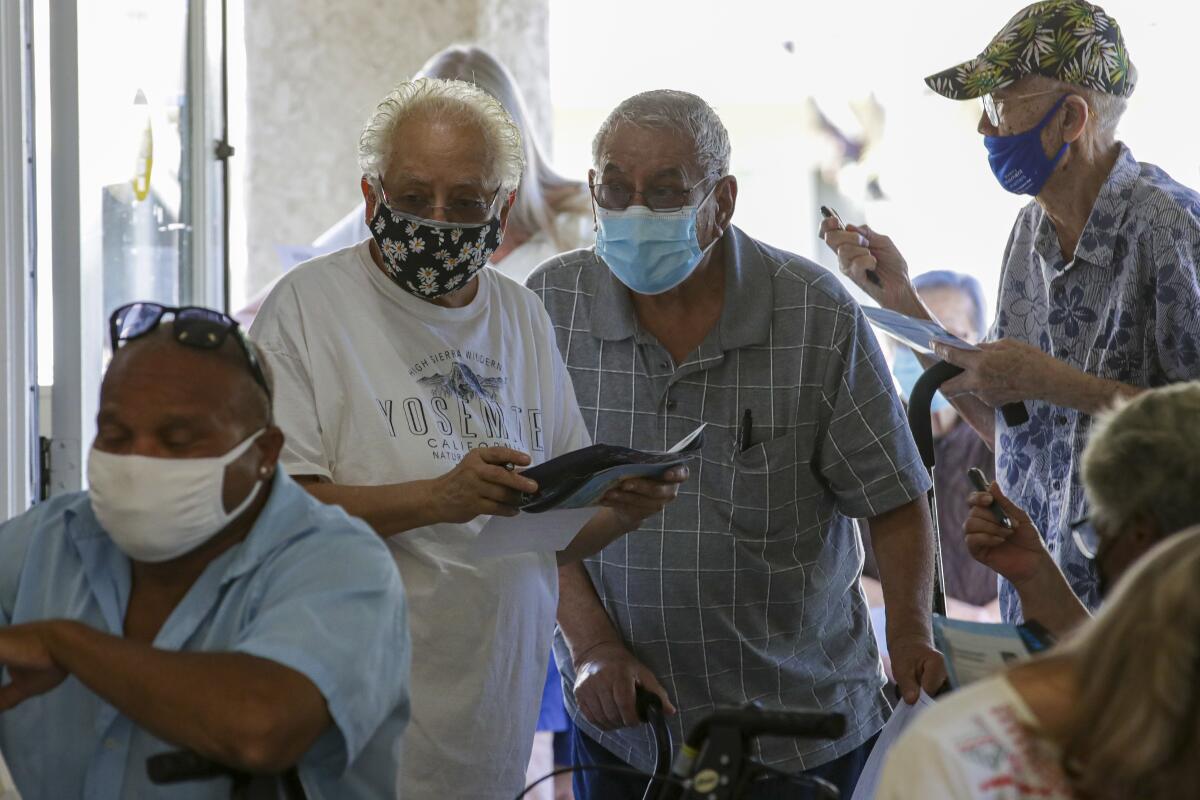
- Share via
People can now mix and match COVID-19 vaccines, but it raises the question: Which booster is the best option?
Federal health officials aren’t giving any specific recommendations, other than to say it’s important to get a booster especially for those at high risk. It’s crucial for people 65 and older, adults 50 and older with underlying health conditions — which includes being overweight or having high blood pressure, depression or diabetes — and anyone who got the Johnson & Johnson vaccine.
All adults with underlying health conditions are eligible for a booster dose, as are all adults who live or work in settings at higher risk for coronavirus exposure, such as employees of hospitals, schools and grocery stores.
But in the absence of an official recommendation, how do you make an informed decision? Here’s what we know:
COVID-19 vaccine boosters are now available. But, they’re only recommended for some people. See if you are eligible here.
Generally, which vaccines have performed better?
The Centers for Disease Control and Prevention published a report in September analyzing vaccine effectiveness against COVID-19 hospitalizations from mid-March through mid-August.
The report found that between two weeks and four months after a person was fully vaccinated, the two-dose Moderna vaccine offered the highest effectiveness against hospitalization: 93%. The two-shot Pfizer-BioNTech vaccine offered 91% protection.
Researchers also looked at the potential for immunity, which wanes over time, four months after getting the last dose. Effectiveness against hospitalizations remained quite strong for Moderna recipients — 92% — but fell to 77% for the Pfizer vaccine.
Available data for the J&J vaccine showed that vaccine effectiveness against hospitalization more than 28 days after getting the single-shot dose was 68%. Data showing the difference in effectiveness on the same time scale as for the Pfizer and Moderna vaccines was not available.
Booster shots for eligible residents are expected to be widely available starting Saturday.
What booster should a J&J vaccine recipient get?
A recent preliminary study, funded by the National Institute of Allergy and Infectious Diseases, looked at mixing vaccine brands as potential boosters.
The study found that people who originally got the Johnson & Johnson shot and received a Moderna booster had antibody levels two weeks later at an astonishing 76 times the amount recorded just prior to the booster. A Pfizer shot led to antibody levels being multiplied by 35, while the same Johnson & Johnson booster quadrupled antibody levels.
Does that mean J&J recipients should get a Moderna booster?
There’s no way to be certain, according to Dr. Robert Wachter, chair of UC San Francisco’s Department of Medicine.
“It’s logical to believe that higher antibodies are correlated with more protection, but it’s more complicated than that,” Wachter wrote in an email to The Times. There are several different components to the immune system, and the “level of antibodies doesn’t always line up with true protection.”
That said, “I think it would be reasonable for a J&J person to get either a Pfizer or Moderna shot,” Wachter said. “If they’re equally easy to get, then I might slightly favor Moderna. I’d prefer either over another J&J.
“It’s pretty unlikely that there is really a material difference in 35 versus 76 times higher,” Wachter said of the differences in antibody levels between Pfizer and Moderna boosters for original Johnson & Johnson recipients. “They’re both so high that they cross the threshold for a high level of protection.”
The director of the CDC, Dr. Rochelle Walensky, declined to give a solid recommendation on which boosters were best.
“If you’ve got J&J followed by a Moderna or Pfizer, you got a really robust antibody response. But we saw some data, also from J&J, that demonstrated that J&J folks who got boosted with J&J had a really good clinical response as well,” Walensky told ABC News’ “Good Morning America.” “So, really, this is about personal preference and talking to your physician about what’s best for you.”
There are reasons why vaccine recipients might opt for a J&J booster. There is a rare risk the Pfizer and Moderna vaccines pose a risk for myocarditis, or inflammation of the heart, generally within seven days following the original administration of the second dose of vaccine. Most recover quickly, though the risk is higher among men under 40.
Knowing that, some men may decide to go with a J&J booster, Dr. Anthony Fauci, the U.S. government’s top infectious diseases expert, said recently on ABC’s “This Week.”
Fauci and Walensky say a booster choice is up to the patient, perhaps in consultation with their doctor.
“Some people may have a preference for the vaccine type that they originally received because they did very well with their initial series. For all three vaccines, this is perfectly fine,” Walensky said at a briefing. “And now, with 10 months of vaccine experience, some may have an expressed preference for one booster type over another.”
Approving COVID-19 booster shots seemed like a slam dunk, but two influential advisory boards raised a host of complicated questions.
What boosters should a Pfizer vaccine recipient get?
The mix-or-match study found that people who originally got the Pfizer vaccine and received a Moderna booster had antibody levels increase 32 times the amount recorded just before the booster. Those who received a Pfizer booster saw antibody levels multiplied by 20, and those who got a J&J booster had antibody levels rise 13 times their previous levels.
For people who originally received the Pfizer shot, it probably doesn’t matter whether they get a Pfizer or Moderna booster, Wachter said.
“I got Pfizer and stuck with getting another Pfizer — just seemed simpler. Why introduce a new agent into my body for probably zero, or maybe tiny, benefit?” he said. “But if your goal were to give yourself any possible advantage in immunity, you can make an argument to switch to Moderna.”
What boosters should a Moderna vaccine recipient get?
The study found that people who originally got the Moderna vaccine and then got a Moderna booster saw 10 times the pre-booster level of antibodies. Those who received a Pfizer booster had antibody levels grow 11 times greater, while those who got a J&J booster saw antibody levels grow six times larger.
Based on those numbers, people who got a Moderna vaccine the first time have no reason to seek a Pfizer booster, Wachter said.
Why are boosters needed?
Studies have shown that the immune response to a new coronavirus threat declined more rapidly in older vaccinated people compared with younger recipients, said Dr. Regina Chinsio-Kwong, a deputy health officer for Orange County.
At a briefing, Fauci said data from Israel show there is a dramatic decrease in infections for vaccinated people who got booster shots compared with those who did not.
Fauci also cited a preliminary study of 4 million people in Israel, which found that 12 or more days after a Pfizer booster shot, the incidence of severe disease in people over 60 was almost 19 times lower, and more than 22 times lower in people 40 to 60 years old.
Finally, Fauci pointed to data released by Pfizer and BioNTech of more than 10,000 people participating in a randomized controlled trial to assess the efficacy of a Pfizer booster after receiving the primary two-dose Pfizer vaccination series. Those who got booster shots “had a relative vaccine efficacy of close to 96%” compared with people who did not get booster shots, Fauci said.
Only five people who got a booster shot developed symptomatic COVID-19; 109 people who didn’t get a booster developed symptomatic COVID-19.
How important is it for young, healthy adults to get a booster?
Generally speaking, boosters are a little less urgent for healthy, younger adults — who are eligible for one if they work in a high-risk setting — Wachter said. But he still recommends that those who are eligible get them, such as a healthy 40-year-old doctor or nurse.
“The main reason to get [a booster] is to prevent getting a mild case of COVID that will keep them out of work, rather than making a huge difference in preventing hospitalization/death — since their risk is low to begin with and the vaccine is still fairly protective, despite some waning” of immunity, Wachter wrote.
The effectiveness of the COVID-19 vaccines does eventually wane, Wachter said, but mostly in terms of protecting them against infection. Even without a booster shot, younger, healthy people are still well protected against severe illness and hospitalization.
COVID-19 boosters are an extra dose of the original vaccine, and some wonder why they weren’t better matched to the Delta variant.
Will boosters end the pandemic?
It’s actually more important, from a public health perspective, to get more unvaccinated people inoculated than to get boosters in vaccinated people.
The percentage of U.S. residents of all ages who have been vaccinated with at least one dose — about 66% — now lags many other countries, including South Korea (80%), Canada and Japan (78%), Italy (77%), France (76%), Brazil (74%) and Britain (73%), according to Our World in Data.
California’s vaccination rate is better than the U.S. overall. The CDC estimates that 75% of California residents have received at least one dose of vaccine.
“As you have heard me say before, we will not boost our way out of this pandemic. And no vaccine — even a boosted vaccine — provides 100% protection,” Walensky said. “So even after you boost, it remains important for us to remain smart about our prevention strategies,” at least while coronavirus transmission remains high or substantial in most areas of the country.
Does booster talk discourage the unvaccinated?
It has been suggested that the discussion of booster shots makes some unvaccinated people even less inclined to get their first dose of vaccine.
“But I am not at all convinced that if we stop talking about boosters — and let’s just, you know, let elderly people have breakthrough infections — that somehow that’s going to get a lot of unvaccinated people to line up and start getting [vaccinated],” Dr. Ashish Jha, dean of the Brown University School of Public Health, said at a recent UC San Francisco forum.
What is the urgency for immunocompromised people?
People with compromised immune systems should clearly get another full dose of vaccine as soon as possible, Wachter said.
“For the immunocompromised, they may have gotten very limited protection from their first two doses, and so it really is a matter of rendering vaccination effective,” Wachter wrote.
He suggested that vaccinated people with compromised immune systems get an additional full dose of the Moderna vaccine because the data to date indicate that shot has led to a stronger antibody response than other vaccines, even though a booster dose of Moderna is half the dosage of each of the two primary shots.
“That should lower the risk of COVID, hospitalization and death, though it’s unlikely that it will reduce the risk back to that of non-immunosuppressed people. Some may need a second booster,” Wachter wrote.
About 3% of people nationwide have compromised immune systems, including those who are receiving cancer treatments, are organ transplant patients or have advanced HIV infection.
U.S. regulators said transplant recipients and others with severely weakened immune systems can get an extra dose of the Pfizer or Moderna vaccines.
What else can be done to protect immunosuppressed people?
Caregivers and family members of people with severely compromised immune systems should take extra precautions to make sure they don’t transmit the coronavirus, said Dr. Robert Kim-Farley, a medical epidemiologist and infectious diseases expert at the UCLA Fielding School of Public Health.
Not only should they be vaccinated and get boosters, but they should also try to avoid any high-risk exposures themselves, so they do not unknowingly transmit disease, Kim-Farley said.
While unlikely, Kim-Farley said it is possible that a fully vaccinated person can get a breakthrough infection and transmit it to someone else, even when asymptomatic.
“Even with a booster, some immunosuppressed patients will remain vulnerable to COVID,” Wachter said. “This is one reason why even people at relatively low risk for a bad COVID outcome — young, healthy people — have a moral obligation to get vaccinated: An unvaccinated person has a good chance of getting Delta and spreading it to others.”
Chinsio-Kwong suggested that even fully vaccinated people in their 20s and 30s avoid high-risk activities, such as going to indoor bars for long periods of time, if they’re caring for or visiting someone who is immunocompromised, such as a grandparent.
“You potentially could be putting your loved one at high risk if you continue these [higher] risk exposures prior to visiting your loved one,” Chinsio-Kwong said. “We should all still take precaution: Even if we are vaccinated, vaccinations is not 100% — but it gives us a significant protection.”
For people who are visiting elderly family members who are not immunocompromised, one protective strategy is to take a rapid coronavirus test just before a visit, and certainly to stay home if you feel sick.
“Say an 80-year-old lives in L.A., and their [vaccinated] kids from all around the country are coming for Thanksgiving holidays. ... They don’t really have to quarantine like in the pre-vaccine days,” said Dr. Peter Chin-Hong, a UC San Francisco infectious diseases expert.
“But, if everybody’s vaccinated, a rapid test might give everyone a sense of whether or not they’re going to be infectious at that particular family event.”
I originally got the J&J shot and am unhappy the Moderna booster is half the dose as the original shot. Am I being shortchanged?
Some recipients of the J&J shot have expressed dismay that the booster shot recommended by the CDC for Moderna is half the dose — 50 micrograms — as what was evaluated in the well-publicized “mix-or-match” study. (That was the study that found that people who originally got the J&J shot and received a Moderna booster had antibody levels two weeks later at 76 times the amount recorded before the booster.)
That has led some people to wonder whether they were being shortchanged.
But Moderna has said the half-dose as a booster “shows robust antibody responses.”
And some infectious-disease experts say the authorized Moderna booster dose will offer plenty of added benefit to those who originally got the J&J shots.
“You don’t need 76 times” the level of antibodies, said Dr. Monica Gandhi, a UC San Francisco infectious-disease expert.
Wachter said many experts believe that the original dosage for each of the two-dose Moderna vaccinations — 100 micrograms — was actually higher than it needed to be, and if there had been more time, the company probably would’ve settled on 50 micrograms as the appropriate dosage.
“I would take the 50 micrograms if it were me — we’re all going to have to follow the science over time to see the efficacy and how durable it is, and I guess there’s a small chance that the 50 micrograms will lead to slightly lower efficacy or less durable response,” Wachter said. “But I’m guessing it will turn out to be fine, and have fewer side effects” than the 100-microgram dose.
Also, seeing the number of antibodies produced in a test tube gives only a partial answer to what booster is really better.
Another study suggests that getting either a Pfizer booster — which is 30 micrograms — or a Moderna booster following a shot similar to J&J are quite beneficial, Gandhi said.
The study, published in the journal Lancet Regional Health Europe, found that following a dose of the AstraZeneca vaccine — a vaccine similar to J&J’s — a follow-up dose of the Pfizer vaccine resulted in 67% effectiveness against symptomatic disease, and a follow-up dose of the Moderna vaccine resulted in 79% effectiveness against symptomatic disease.
Either was better than following up the AstraZeneca vaccine with another dose of the AstraZeneca vaccine, which resulted in 50% effectiveness against symptomatic disease during a Delta surge.
Importantly, any two-shot combination with a first-dose AstraZeneca vaccine was highly effective in preventing hospitalization. Of more than 541,000 vaccinated people in this study, only three people were later hospitalized. Unvaccinated people were 16 times more likely to be hospitalized than vaccinated people in this study.
“All the vaccines work amazingly well against severe disease,” Gandhi wrote in an email. “But if you want to avoid ANY symptomatic infection (even sniffles!),” she said, a Pfizer or Moderna boost is better following a J&J-style shot than getting a J&J-style booster.
More to Read
Sign up for Essential California
The most important California stories and recommendations in your inbox every morning.
You may occasionally receive promotional content from the Los Angeles Times.
